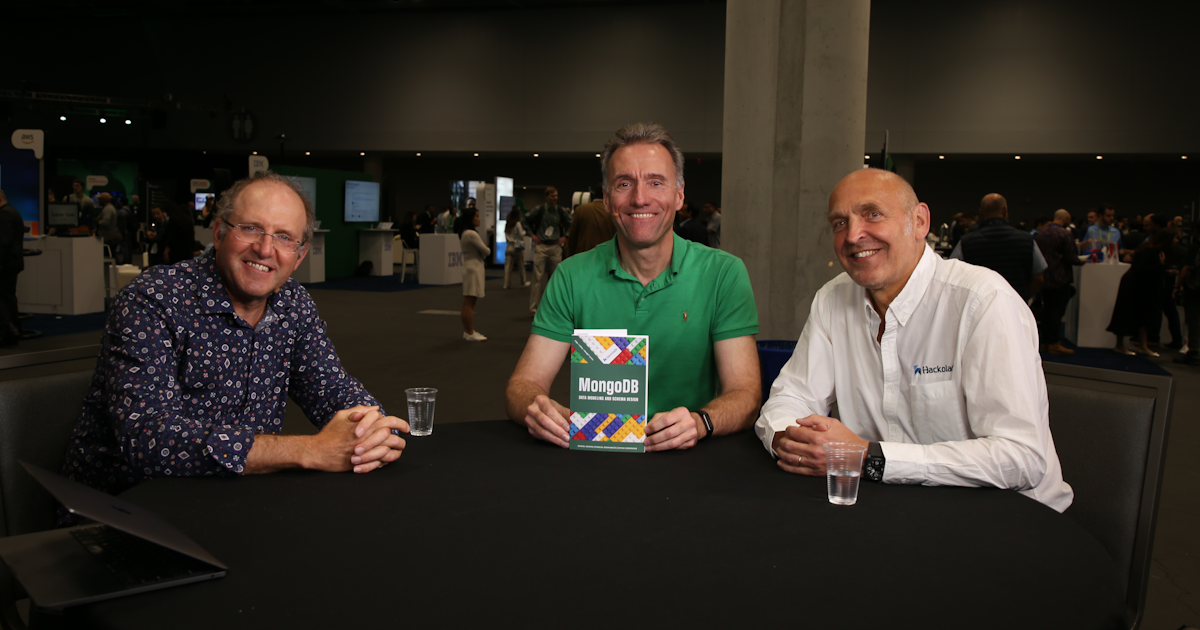 BIG DATA
BIG DATA
 BIG DATA
BIG DATA
 BIG DATA
BIG DATA
In the fast-paced world of data-driven technologies, MongoDB Inc. has emerged as a powerful and flexible database platform.
As organizations seek to unlock the full potential of MongoDB, data modeling and schema design play a pivotal role in ensuring optimal performance and leveraging its unique features.
Industry experts Steve Hoberman (pictured, left), lecturer at Columbia University; Pascal Desmarets (right), founder and chief executive officer at Hackolade (IntegrIT SA/NV); and Daniel Coupal (center), developer advocate at MongoDB, shared their insights in a panel discussion at MongoDB .Local NYC 2023.
“MongoDB is great if you really want to leverage all of its capabilities for complex use cases, complex organizations; you really need to think about your data model so you can best leverage the features of MongoDB,” Desmarets said.
Desmarets, Hoberman and Coupal spoke with theCUBE industry analyst John Furrier at the MongoDB .local NYC event, during an exclusive broadcast on theCUBE, SiliconANGLE Media’s livestreaming studio. They discussed the significance of data modeling, the evolving landscape of schema design and the role of MongoDB in the AI-driven future. (* Disclosure below.)
The trio’s expertise and collaboration culminated in the book “MongoDB Data Modeling and Schema Design,” which serves as a resource for data professionals and MongoDB developers. The book primarily caters to two audiences: data professionals experienced in traditional data modeling seeking to apply their skills to MongoDB and developers skilled in MongoDB document development who need guidance on effective data design techniques.
“Steve was teaching relational database for years, wanted to have a Siri on NoSQL databases,” Coupal said. “He has the goal of getting six of them, and he created a core that is used in all the books. For this one, he needed some experts, so he knew Pascal and he got in touch with Pascal. And I received a letter from Steve. We realized that what I’ve been expert in was a good contribution to the book. And we divided the work and went on. To me the collaboration has been absolutely fantastic.”
The trio also discussed the importance of data modeling and schema design in MongoDB. The company’s document model is a differentiator, allowing data storage in JSON format, which is flexible and developer-friendly. However, Desmarets cautioned against assuming that MongoDB’s simplicity implies the ability to build complex systems without thoughtful data modeling. Proper data modeling is essential to leverage MongoDB’s capabilities effectively.
“The danger is that it looks so simple that … it’s deceptive,” he added. “People get the wrong idea that they can build very complex things without really thinking it through.”
The conversation also addressed the evolving landscape of data modeling, particularly the shift from the old school to the new school. While schema design was previously associated with rigid, normalized structures, MongoDB’s document model allows for more flexibility and schema-less design.
Best of all, MongoDB is conducive to AI applications. It enables the discovery of unexpected relationships within the data, paving the way for auto-schema creation and pattern recognition. With data becoming the lifeblood of companies, data modelers are recognizing the power and significance of their role. They are the unsung heroes laying the foundation for successful data-driven systems and applications, according to Hoberman.
“I know from my perspective, how I’ve been using tools like these language learning models, one is I use them to come up with better definitions,” Hoberman said. “If I’m working with a university and I have a starter definition for a student, I could use these tools to come up with a better definition. Also, when I teach modeling, a lot of what I do is question and answer. Possibly a language learning model can do that for me.”
Here’s the complete video interview, part of SiliconANGLE’s and theCUBE’s coverage of the MongoDB .local NYC event:
(* Disclosure: TheCUBE is a paid media partner for the MongoDB .local NYC event. Neither MongoDB Inc., the sponsor of theCUBE’s event coverage, nor other sponsors have editorial control over content on theCUBE or SiliconANGLE.)
Support our mission to keep content open and free by engaging with theCUBE community. Join theCUBE’s Alumni Trust Network, where technology leaders connect, share intelligence and create opportunities.
Founded by tech visionaries John Furrier and Dave Vellante, SiliconANGLE Media has built a dynamic ecosystem of industry-leading digital media brands that reach 15+ million elite tech professionals. Our new proprietary theCUBE AI Video Cloud is breaking ground in audience interaction, leveraging theCUBEai.com neural network to help technology companies make data-driven decisions and stay at the forefront of industry conversations.